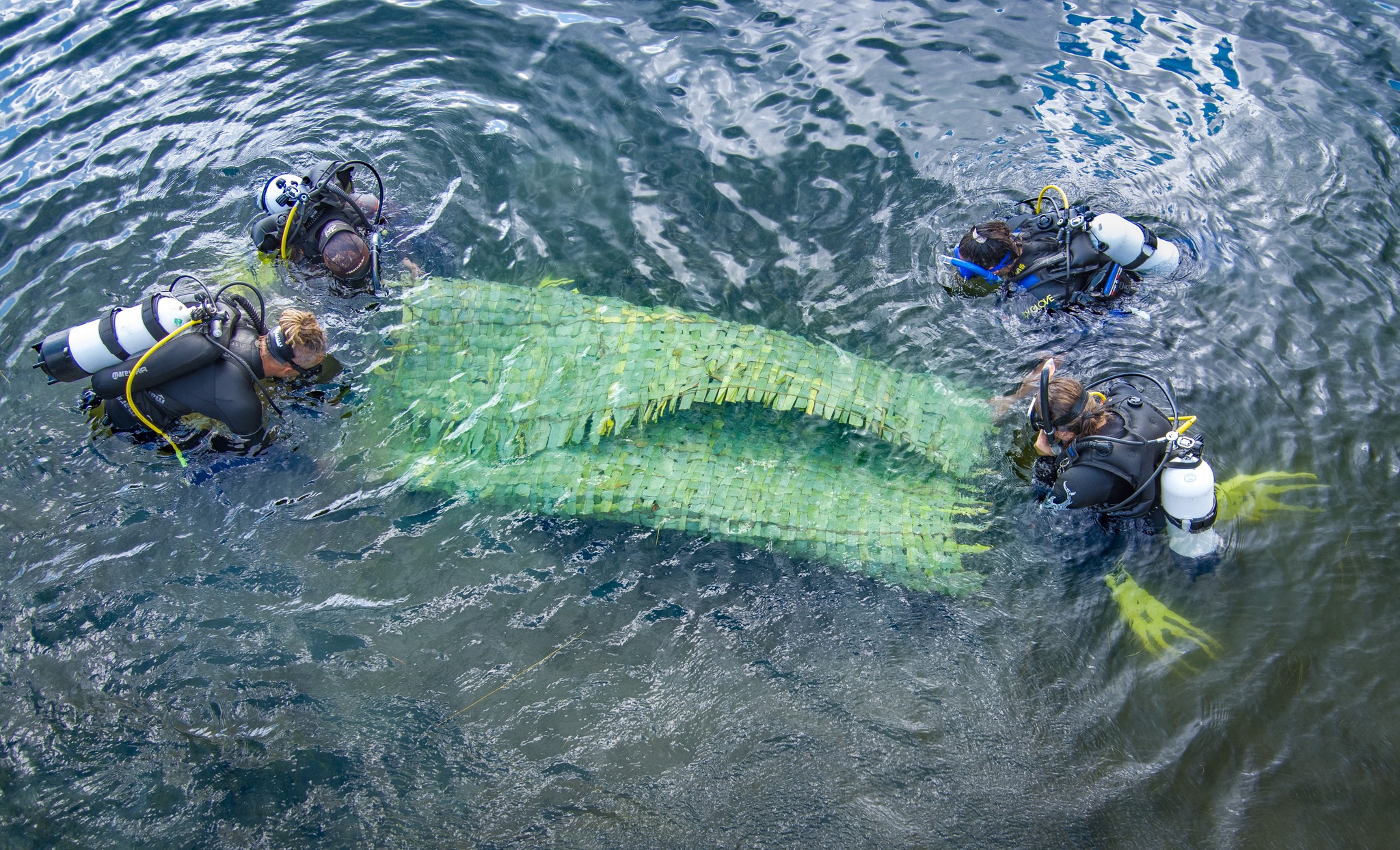Our Dive Squad here at Te Arawa Lakes Trust continue to drive the work being done on Uwhi or Harakeke weed mats.
Biosecurity Manager William Anaru says, “Our dive team are our eyes and ears underwater – they help us continue to be connected to the progress this mahi is doing.
Uwhi have been laid as a solution to suppressing aquatic pest plants like and create a habitat for native species like koura and the common bully.
“We have been tracking the trial very closely and our data is pointing us to where we should be – that means our Uwhi are doing what our mātauranga Māori and contemporary knowledge advised us to be.”
Uwhi is a tangible solution to the restoration of wai and waterways, empowering Te Arawa whānau, hapū and iwi knowledge.
Feb 23: Uwhi Trial Healing More Than Just Rotorua Te Arawa Lakes
The Uwhi trial is healing more than just Te Arawa lakes; its flow-on effects are creating sustainable employment for some of the region’s hardest-hit COVID casualties, and reconnecting people to their tupuna.
Uwhi (harakeke weed mats) were laid in Lake Rotoiti and Lake Tarawera in December as part of a collaborative trial led by Te Arawa Lakes Trust with support from Toitū Te Whenua Land Information New Zealand through its Jobs for Nature programme.
Te Arawa Lakes Trust divers have been monitoring the sites regularly to gauge progress and early results show a consistent decrease in pest weeds at both sites.
A third tranche of Uwhi has been created by local weavers, overseen by Te Roopū Raranga Ki Rotorua, and placed in Lake Rotomā in February.
Many of these hand-picked weavers lost their jobs due to COVID and Uwhi has provided them with not only employment, but the opportunity to give back to the community.
Te Roopū Raranga Ki Rotorua Kaitakawaenga, Judy Howe-Wiperi, says working on the Uwhi has been cathartic for her, having poured her blood, sweat and tears into the kaupapa from day one.
“When we were approached to collaborate on this kaupapa I was going through a tough time in my personal life.
“Uwhi gave me a purpose and I poured all my pain and heartache into creating something that would go out and make a positive difference in our world.
Ms Howe-Wiperi says Uwhi has created the potential for sustainable work for the weavers who have had their lives turned upside down by COVID.
“Every single weaver in this group has been helped by the Uwhi kaupapa and now we are ready to share our knowledge and skills to help other people, not just in Aotearoa, but the world.
“We have already had inquiries from Tūwharetoa, Ngāi Tahu and even officials from Australia looking for similar solutions for their lakes.
“I just know our tupuna would be looking down on us right now saying ‘wow’; This Uwhi trial has helped many of us reconnect with our tupuna in a way we hadn’t before.”
Te Arawa Lakes Trust Lead Diver Cory O’Neill says at this point of the trial, the team is confident the positive results will be sustained and potentially increase over time.
“We started the monitoring process with no expectations. We had an idea based on scientific knowledge of how the Uwhi may work, but we have nonetheless been thrilled to see the early trends indicating Uwhi are an effective weed control measure.
“This centuries old solution to a new-age problem is testament to the pivotal role mātauranga Māori can play alongside western science.
O’Neill says placing Uwhi in Lake Rotomā will allow divers to assess its effectiveness against pest weeds in a unique location.
“With different topography to our current two sites, as well a distinctive pest weed profile, Lake Rotomā will add depth and breadth to our monitoring results and will give more credence to the effectiveness of Uwhi.”
Te Arawa Lakes Trust biosecurity manager William Anaru says the trial highlights the advantages of genuine collaboration between iwi and government agencies.
“Through the dedication and hard work of everyone involved, we have been able to carry out a mātauranga Māori trial that is creating a positive difference in our lakes.
Te Arawa Lakes Trust has been working with hapū Tamateatutahi and Te Tahuna Trust to install the latest Uwhi.
“Tangata whenua knowledge is key to the environment we are working in, and their occupation of the area, which spans more than 10 generations, can only help us better understand the work we are doing.
“Te Arawa Lakes Trust will also commit to working with our partners to make this pest weed solution available to everyone.”
Toitū Te Whenua Land Information New Zealand Biosecurity and Biodiversity Manager Tracey Burton says once again it’s exciting to partner in this kaupapa, which recognises the value of supporting Māori to achieve their aspirations for their whenua and wai.
“We’re proud to see this research underway with its potential to change the way we manage lake weeds in the future while contributing to positive environmental and cultural outcomes and creating jobs in the region.”

